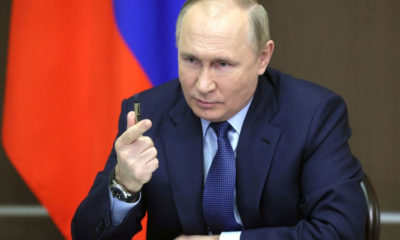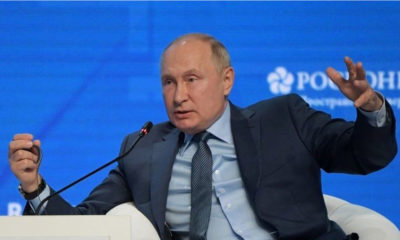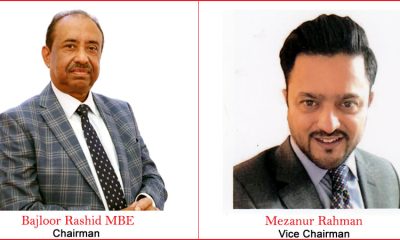World
Europe is losing nuclear power just when it really needs energy
Published
3 years agoon
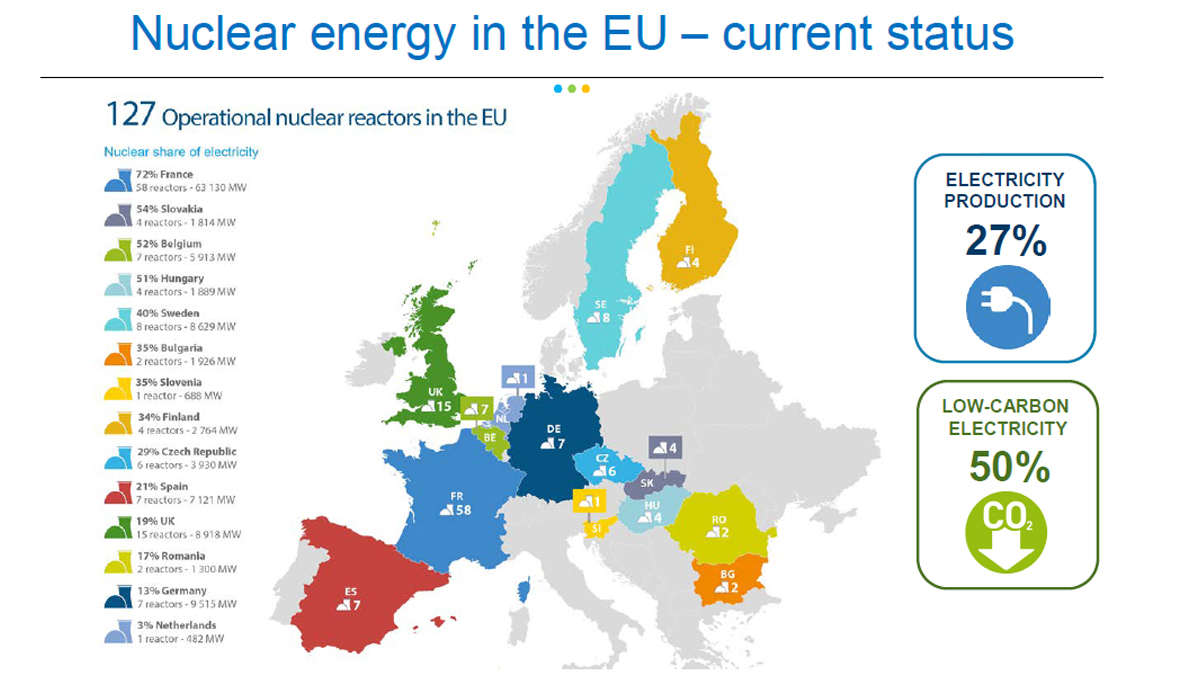
As the Fukushima disaster unfolded in Japan in 2011, then-German Chancellor Angela Merkel made a dramatic decision that delighted her country’s anti-nuclear movement: all reactors would be ditched.
What couldn’t have been predicted was that Europe would find itself mired in one of the worst energy crises in its history. A decade later, the continent’s biggest economy has shut down almost all its capacity already. The rest will be switched off at the end of 2022 — at the worst possible time.
Wholesale power prices are more than four times what they were at the start of the coronavirus pandemic. Governments are having to take emergency action to support domestic and industrial consumers faced with crippling bills, which could rise higher if the tension over Ukraine escalates. The crunch has not only exposed Europe’s supply vulnerabilities, but also the entrenched cultural and political divisions over the nuclear industry and a failure to forge a collective vision.
Other regions meanwhile are cracking on. China is moving fast on nuclear to try to clean up its air quality. Its suite of reactors is on track to surpass that of the US, the world’s largest, by as soon as the middle of this decade. Russia is moving forward with new stations at home and has more than 20 reactors confirmed or planned for export construction, according to the World Nuclear Association.
“I don’t think we’re ever going to see consensus across Europe with regards to the continued running of existing assets, let alone the construction of new ones,” said Peter Osbaldstone, research director for power and renewables at Wood Mackenzie Group Ltd. in the UK “It’s such a massive polarizer of opinions that national energy policy is required in strength over a sustained period to support new nuclear investment.”
France, Europe’s most prolific nuclear energy producer, is promising an atomic renaissance as its output becomes less reliable. Britain plans to replace aging plants in the quest for cleaner, more reliable energy sources. The Netherlands wants to add more capacity, Poland also is seeking to join the nuclear club, and Finland is starting to produce electricity later this month from its first new plant in four decades.
Belgium and Spain, meanwhile, are following Germany’s lead in abandoning nuclear, albeit on different timeframes. Austria rejected it in a referendum in 1978.
Nuclear power is seen by its proponents as vital to reaching net-zero targets. Once built, reactors supply low-carbon electricity all the time, unlike intermittent wind or solar.
Plants, though, take a decade or more to construct at best and the risk is high of running over time and over budget. Finland’s new Olkiluoto-3 unit is coming on line after a 12-year delay and billions of euros in financial overruns. Then there’s the waste, which stays hazardous for 100,000 years.
“Despite growing international calls to address climate change and a growing number of national net-zero pledges, the global nuclear industry remains largely on its heels,” said Chris Gadomski, head of nuclear research at Bloomberg New Energy Finance.
Indeed, European Union members are still quarreling over whether nuclear even counts as sustainable. Electorates are also split. Polling by YouGov Plc published in December found that Danes, Germans and Italians were far more nuclear-skeptic than the French, British or Spanish.
“It comes down to politics,” said Vince Zabielski, partner at New York-based law firm Pillsbury Winthrop Shaw Pittman LLP, who was a nuclear engineer for 15 years. “Everything political ebbs and flows, but when the lights start going off people have a completely different perspective.”
What’s Behind Europe’s Skyrocketing Energy Prices
There’s a risk of rolling blackouts this winter. Supply concerns plaguing Europe have sent gas and electricity prices to record levels and inflation has ballooned. There’s also mounting tension with Russia over a possible invasion of Ukraine, which could lead to disrupted supplies of gas. All this is strengthening the argument that Europe needs to reduce its dependence on international sources of gas.
Europe will need to invest 500 billion euros ($568 billion) in nuclear over the next 30 years to meet growing demand for electricity and achieve its carbon reduction targets, according to Thierry Breton, the EU’s internal market commissioner. His comments come after the bloc unveiled plans last month to allow certain natural gas and nuclear energy projects to be classified as sustainable investments.
“Nuclear power is a very long-term investment and investors need some kind of guarantee that it will generate a payoff,” said Elina Brutschin at the International Institute for Applied Systems Analysis. In order to survive in liberalized economies like the EU, the technology needs policy support to help protect investors, she said.
That already looks like a tall order. The European Commission has been told by a key expert group that the labeling risks raising greenhouse gas emissions and undermining the bloc’s reputation as a bastion for environmentally friendly finance.
Austria has threatened to sue the European Commission over attempts to label atomic energy as green. The nation previously attempted a legal challenge, when the UK was still an EU member, to stop the construction of Electricite de France SA’s Hinkley Point C plant, in the west of England. It has also commenced litigation against new Russia-backed projects in neighboring Hungary.
Germany, which has missed its carbon emissions targets for the past two years, has been criticized by some environmentalists and climate scientists for shutting down a supply of clean power at the worst time. Its final three reactors will be halted this year. Yet that was never going to be reversed with the Greens part of the new coalition government.
The contribution of renewables in Germany has almost tripled since the year before Fukushima, and was 42% of supply last year. That’s a drop from 46% from the year before and means the country’s new government will have to install some 3 gigawatts of renewables — equivalent to the generating capacity of three nuclear reactors — every year this decade to hit the country’s 80% goal.
“Other countries don’t have this strong political background that goes back to three decades of anti-nuclear protests,” said Manuel Koehler, managing director of Aurora Energy Research Ltd., a company analyzing power markets and founded by Oxford University academics.
At the heart of the issue is that countries with a history of nuclear weapons will be more likely to use the fuel for power generation. They will also have built an industry and jobs in civil engineering around that.
Germany’s Greens grew out of anti-nuclear protest movements against the stationing of US nuclear missiles in West Germany. The 1986 Chernobyl meltdown, which sent plumes of radioactive fallout wafting over parts of western Europe, helped galvanize the broader population. Nuclear phase-out plans were originally laid out in 2002, but were put on hold by the country’s conservative governments. The 2011 Fukushima meltdowns reinvigorated public debate, ultimately prompting Merkel to implement them.
It’s not easy to undo that commitment, said Mark Hibbs, a Bonn, Germany-based nuclear analyst at Carnegie Endowment for International Peace: “These are strategic decisions, that have been taken long in advance.”
In France, President Emmanuel Macron is about to embark on a renewed embrace of nuclear power. The nation produces about two-thirds of its power from reactors and is the biggest exporter of electricity in Europe. Notably, that includes anti-nuclear Germany and Austria.
EDF, the world’s biggest nuclear plant operator, is urging the French government to support construction of six new large-scale reactors at an estimated cost of about 50 billion euros. The first of them would start generating in 2035.
But even France has faced setbacks. Development of new projects has been put on hold after years of technical issues at the Flamanville-3 project in Normandy. The plant is now scheduled to be completed next year.
In the UK, Business Secretary Kwasi Kwarteng said that the global gas price crisis underscores the need for more home-generated clean power. By 2024, five of Britain’s eight plants will be shuttered because they are too old. Hinkley Point C is due to be finished in 2026 and the government will make a final decision on another station before an election due in 2024.
One solution is to build small modular reactors, or SMRs, which are quicker to construct and cheaper. The US is at the forefront of efforts to design smaller nuclear systems with plans also underway in the UK and France. Yet they too have faced delays. SMR designs have existed for decades though face the same challenging economic metrics and safety and security regulations of big plants.
The trouble, as ever, is time. “Any investment decisions you make now aren’t going to come to fruition until the 2030s,” said Osbaldstone, the research director at Wood Mackenzie. “Nuclear isn’t an answer to the current energy crisis.”
Disclaimer: This article first appeared on Bloomberg, and is published by special syndication arrangement.
The most influential and award-winning tech journalist based in Dhaka, Bangladesh. President of Bangladesh Tech Journalists umbrella association name Bangladesh ICT Journalist Forum(BIJF).He works for The Daily Ittefaq and is responsible for covering news, editing posts, reviewing devices, producing video reviews, and communicating with the reader base. Journalist, editor, technology, personal technology, reviews, features, analysis, media.

South Asia
Imran Khan allies take lead but Nawaz Sharif claims victory
Published
1 year agoon
February 10, 2024
Three-times-prime minister Nawaz Sharif claimed victory in Pakistan’s general elections – even though independent candidates backed by rival Imran Khan are in the lead as counting continues.
Sharif said that his political party has emerged as the largest in the vote and will discuss forming a coalition government.
The lead of independent candidates backed by jailed former prime minister Imran Khan came as a surprise given claims by his supporters and a national rights body that the balloting was manipulated to favor Sharif.
Election results were hit by long delays overnight, causing frustration and panic among voters who alleged it was due to ballot-rigging.
Independent candidates have secured around 85 seats, while Sharif’s PML-N is some way behind with around 59.
The Pakistan Peoples Party (PPP) of Bilawal Bhutto Zardari is trailing a close third with 31 seats so far.
Any party needs 133 seats in parliament for a simple majority but many analysts believe the vote may not produce a clear winner.
However, Sharif, who was the favorite to come out of this election leading the country, has lost his Mansehra constituency seat in Khyber Pakhtunkhwa, reported Geo News.
Sharif will still enter parliament as an MP, winning another seat he contested in Lahore.
Sharif said his deputies would meet other political parties later to discuss forming a coalition government.
Lack of clear majority could cause trouble
Analysts predict the problems will mount for Pakistan and its economy if the election does not result in a clear majority for anyone.
There are concerns that things will become particularly tricky given Islamabad’s request for a new bailout program from the International Monetary Fund (IMF) after the current arrangement expires in three weeks.
A coalition government “would probably be unstable, weak,” and “the big loser… will be the army. Because the army really has staked its reputation on its ability to deliver this vote”, Marvin Weinbaum, director of Afghanistan and Pakistan studies at the Middle East Institute in Washington, told the British media Independent.
The election was expected to help resolve the crises Pakistan has been dealing with but a fractured verdict “could very well be the basis for even deeper exposure to forces which would create instability”, he said.
Rigging fears
Allegations of poll rigging overshadowed election day itself, as well as authorities’ hours-long shutdown of Pakistan’s mobile phone network.
“A concerted effort has been made to hijack the election,” PTI information secretary Raoof Hasan told AFP late Friday.
“They were not successful because there is deep-seated commitment to Khan among the people.”
Caretaker Interior Minister Gohar Ejaz defended the “difficult decision” to suspend mobile phone services on security grounds.
“We were fully aware that suspension of mobile services would impact the transmission of election results across Pakistan and delay the process, however, the choice between this delay and safety of our citizens was quite straightforward,” he said in a statement on Friday.
Digital rights activist Usama Khilji said the mobile service blackout “strengthens the popular perception that the elections are rigged by the deep state”.
But Mohammad Zubair, a 19-year-old street hawker in Lahore, said PTI supporters would not accept a PML-N victory.
“Everyone knows how many seats Khan’s independent candidates have won,” he said. “They don’t have a symbol, or a captain, or a flag, or banners but still we have won on the field.”
World
Web Summit appoints former Wikipedia boss Katherine Maher as CEO
Published
2 years agoon
October 30, 2023
Md Mojahidul Islam
LISBON – Web Summit’s new Chief Executive Officer Katherine Maher brings her ability to bridge the worlds of technology, humanity, and the dialog needed to shape the future. She has been appointed by the board to lead the company through this period of transition.
Her experience managing some of the world’s biggest organizations will support Web Summit through its flagship Web Summit in Lisbon event and focus on its mission to connect people and ideas that change the world.
Maher led Wikimedia Foundation, the global nonprofit behind Wikipedia, which has over 1 billion monthly users, as chief executive for five years. During her tenure, she brought unprecedented success to the Wikimedia movement and solidified Wikipedia’s reputation as a trusted source of free knowledge worldwide.
Additionally, Maher is chair of messaging platform Signal Messenger, a non-resident senior fellow on Democracy and Technology at the Atlantic Council, and a term member of the Council on Foreign Relations, a World Economic Forum Young Global Leader, and a security fellow at the Truman National Security Project.
Web Summit also announced today it has appointed Damian Kimmelman as a non-executive board director. Kimmelman is a renowned technology leader and innovator who has co-founded several successful companies and organizations, both in the United States and Europe, including edtech startup Batelle.com, non-profit FoundersPledge.com, business bank Rho.co, and business data provider DueDil.com, now Fullcircl.
“I am excited to join Web Summit, because I believe in Web Summit’s mission to connect people and ideas that change the world,” Maher said. “In a present where technology is interwoven into every aspect of our lives, and in a future where it represents our greatest hope and our greatest disruptor, Web Summit’s role as a place for connection and conversation is more urgent than ever,” she added. “Our immediate task is returning the focus to what we do best: delivering dialog among all those connected with technological advancement.”
Shared future
“I’m also delighted to be joined on the board of Web Summit by Damian Kimmelman. As well as his extraordinary track record as a founder, Damian will also bring the Web Summit board invaluable insights into the global tech community which will define our shared future,” Maher continued.
Kimmelman said: “I’ve been attending Web Summit for the past 10 years, and I keep coming back because it’s where I’ve forged so many of my most meaningful business relationships. I couldn’t be more excited to be joining an organization that has had such an impact on my career.”
“I firmly believe in Web Summit’s mission to help make the meaningful connections that change the world, and I’m looking forward to working with Katherine and the board to achieve this and to support the dialog which will ensure that Web Summit remains the world’s leading tech conference,” Kimmelman continued.
In previous roles at the United Nations Children’s Fund, the National Democratic Institute, Access Now and the World Bank, Maher focused on supporting the use of technology and data to help improve peoples’ lives and governance, especially in developing nations.
While at Wikimedia Foundation, she managed over 1 billion monthly users, led a global volunteer force of nearly 300,000 people across 75 countries, and managed an annual budget of USD140 million. During her tenure she doubled annual fundraising, drove the first growth in readership and contributors in more than a decade, and significantly expanded the platform’s presence in emerging markets.
Under her leadership, Wikipedia attained the highest public trust in the institution’s history, defined an expansive strategic direction for the future, with a particular emphasis on platform innovation, machine learning, demographic diversity, and new markets. During this time, both Maher and Wikimedia were vocal and prominent public champions of the rights to freedom of expression, inquiry, and privacy.
Filling the void
Kimmelman is a renowned technology leader and innovator who has co-founded numerous successful companies and organizations, including healthtech startup Batelle.com, FoundersPledge.com, Rho.co, and DueDil.com, a business focused on improving how companies access and use data. DueDil recently partnered with Artesian to become Fullcircl. He will assume the non-executive director role on the board vacated by Nathan Hubbard following the end of his period of service as director.
Web Summit 2023 will take place from November 13 15, with a full program, including 25-plus stages, PITCH competitions, investors meetings, masterclasses and roundtables, and Mentor Hours. Night Summit events will also be happening across some of the most exciting neighborhoods in Lisbon, giving our attendees the opportunity to network after-hours.
The event will reflect a rich, global tapestry of perspectives and experiences, with a record-breaking 2,600 startups – almost one third of which were founded by women – from more than 85 countries, including Trinidad and Tobago, Lichtenstein, Peru, and Ghana. These startups will join more than 800 investors, 300 partners and 2,000 media from 160-plus countries. Our community initiatives are well underway, including women in tech, which – as always – will support our aim to reach gender parity.
About Web Summit:
Web Summit runs the world’s largest technology events, connecting people and ideas that change the world. Web Summit events have gathered half a million people across Web Summit in Europe, Web Summit Rio in South America, Collision in North America, Web Summit Qatar in the Middle East, and RISE in Asia since the company’s beginnings as a 150-person conference in Dublin in 2009.
Web Summit’s mission has been to create software that enables meaningful connections between company heads, founders, investors, media, politicians and cultural figureheads.
Forbes lauds Web Summit as “the best tech conference on the planet.” Bloomberg calls it “Davos for geeks.” Politico dubs it “the Olympics of tech.” The Guardian styles it “Glastonbury for geeks.” Financial Times touts Web Summit as “the world’s largest tech conference.” The Telegraph extols it as the “planet’s best tech conference.”
Useful links:
Web Summit website: https://websummit.com/
Web Summit media kit: https://websummit.com/media-kit
Web Summit images: www.flickr.com/websummit
About Web Summit: www.about.websummit.comWeb Summit:
Web Summit HQ, Tramway House, 32 Dartry Road, Dartry, Dublin 6, Ireland, D06 XT86.
World
Dubai airport traffic jumps 50%, tops pre-pandemic levels
Published
2 years agoon
August 22, 2023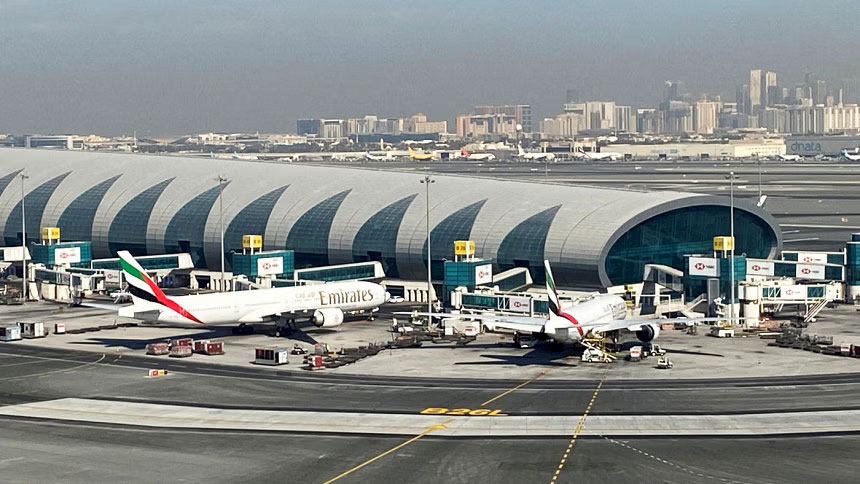
Passenger traffic at Dubai international airport leapt 50 percent in the first half of the year, surpassing pre-pandemic levels, its operator said on Tuesday.
Dubai, the world’s busiest airport for international passengers before Covid-19, had 41.6 million visits in the six months to June, just over the number recorded in the first half of 2019, Dubai Airports said in a statement.
The passenger figure also marks a 50 percent increase from the 27.9 million seen in the same period last year.
“As we recover with our (first-half) traffic surpassing pre-pandemic levels, we continue to remain committed to ensuring every guest who travels through our airport leaves with a smile,” said Paul Griffiths, CEO of Dubai Airports.
Passenger forecasts for the year have been raised to 85 million, up from 83.6 million.
“Dubai Airports is optimistic about the levels of demand and is expecting record-breaking numbers during the winter season,” the company said in a statement.
“We’re preparing for an exceptionally busy rest of the year.”
Dubai airport closed briefly to commercial flights from March to July 2020 but was one of the first travel hubs to reopen after the pandemic.
In 2020, it received only 25.9 million passengers, down from the 86 million the previous year.

Bajloor Rashid Elected Chairman, Mezanur Rahman Elected Vice Chairman of Progressive Life Insurance

WB to provide $250m loan to modernise five public sector functions

A10 Networks Expands its Cybersecurity Portfolio with Acquisition of ThreatX Protect


